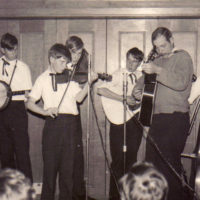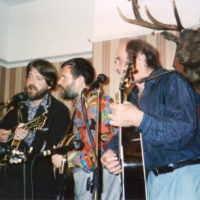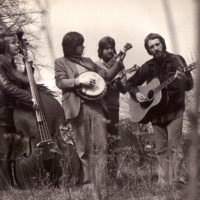
Rick Townend, who has been playing bluegrass music since he was a schoolboy, is the 2019 recipient of the British Bluegrass Music Association’s Jan Jerrold Award. The award salver was presented in his absence at the association’s recent AGM held during the Orwell Bluegrass Festival weekend.
In a statement, the British Bluegrass Music Association (BBMA) said …
Rick started playing bluegrass in the Echo Mountain Band [sic] – initially a group of pupils at the Sevenoaks School. In 1964 the band went on to win both Vocal and Instrumental Group at the Cambridge Folk Festival. Echo Mountain Band went on to play for a number of years with their final performance being in 1980 (plus the odd reunion gig). The band was closely involved with Bill Clifton (USA), who was living at that time in the UK, and they would sometimes accompany him on his personal performances. Rick’s brother Andy was a top-class mandolinist and a big influence in the British scene. He sadly died in July 1998 which was a major loss to our British bluegrass community.
Rick organised the Wadhurst Bluegrass Days – an event in Sussex that was ran annually for several years. He is still very generous with his time and knowledge and continues to organize educational events/ festivals/ promotions. To this day he still publishes one of the most comprehensive listings of bluegrass events for his geographical area. Rick Townend is a true servant of our bluegrass community, and a deserving recipient of the 2019 Jan Jerrold Award.
Rick Townend reflects on the meaning of the award in typically modest fashion ….
“I feel greatly honored, having known Jan and been aware of all that he did (along with yourself) for the bluegrass scene over the years until his tragic and untimely death. His work, with Phill Morley, in keeping the magazine [British Bluegrass News] going in the 1970s, ’80s and ’90s was particularly valuable in connecting the people – musicians, event organizers, fans – who made up the bluegrass scene of those days. I can remember back in the 1960s that it was only through the general folk music scene that we were able at all to keep in touch with others, and to find out about the occasional visits of American bands and performers.
Jan himself operated as a promoter, putting on concerts, organising tours, and running the London Bluegrass Club of those days, at first in a pub near Dalston and later in the 100 Club in Oxford Street. Unusually, he was one of the few bluegrass fans who – as far as I know – never picked up an instrument but, he always involved UK musicians as far as he could. But his magnum opus was certainly the bringing together of the people who started up the British Bluegrass Music Association – you will probably have better memories (and have taken more consistent notes) about this than me! Over the years, and with the help of the Internet, the bluegrass scene has grown in line with that in the USA, together with the fans of old-time music, with whom there is still a good-natured overlap in many places.
Jan’s death hit us all hard, but he had engendered a ‘can-do’ spirit in us, and the network put in place by the BBMA has grown and enabled and encouraged new – and many younger – bands and musicians, and helped the spread of venues which put on our music. In my own south-east England area, where there were in the 1980s less than a dozen bluegrass or old-time events in a month, there are now sometimes that many in two or three days, with new regular concert venues set up by musicians, such as the Little Opry (Margate), the Sands Room (Farnham) and ‘My Grass is Blue’ (Farringdon Road, London), general folk/roots venues with regular bluegrass events, e.g. the Green Note (Camden Town) or ‘Square Roots (Portsmouth), and too many weekly or monthly sessions even to begin to list. Dotted amongst these in the calendar are tour dates by visiting artists.
The BBMA has continued Jan’s work to ease the dreadful task for touring bands of obtaining work permits and sorting tax status. This area is still, despite the freedom of the internet, the biggest barrier to building the scene internationally.”
I think that it is fair to say that multi-instrumentalist Townend has done many, if not more, of those jobs. As well as being a very good musician and singer.
He has served as treasurer – for three years – as a committee member, and as a regional representative for the BBMA (for the south east of England). Later, for many years, Townend circulated his Bluegrass & Old Time Music listings sharing information about activities for the same area. Current dates for the area are now available online.
Townend, who plays the banjo, guitar, fiddle, mandolin, autoharp, and steel guitar, prides himself on having started the UK’s first school bluegrass band, The Echo Mountain Boys, in 1962.
Earlier he had learned to play the piano before at the age of 12 progressing to the guitar and then to the banjo. While at Sevenoaks School, in Kent, where his father was head of music, Townend developed an interest in jazz, pop and classical music. However, it was the influence of Pete Seeger’s banjo and some of the Alan Lomax / Shirley Collins field recordings from the US southern states that led to Townend becoming hooked on bluegrass and old-time music.
It was at the school in 1962 that Rick Townend, playing banjo; with his brother Andy, mandolin and, later, fiddle; Mick Audsley, guitar and lead vocal; Peter Green, autoharp; and Derek Bleyberg, double bass; formed the Echo Mountain Boys, so named from Echo Mount, a hill in front of Knole House, near Sevenoaks.
The following year Bill Clifton came to live in Sevenoaks, and after seeing a newspaper notice of Clifton’s arrival in the area, Townend’s mother visited Clifton and spoke of the brothers’ burgeoning band. Thus, began a long and fruitful relationship that saw Clifton mentor the group, share bluegrass recordings and, with the help of Washington DC luthier Tom Morgan, acquire professional-quality instruments for the brothers.
In May 1964 Clifton, backed by The Echo Mountain Boys, played at a concert at Sevenoaks School, their first show together. In the fall of that year they played at a Folk Voice Convention and by July of 1965 the band was impressive enough to share the stage with Clifton at a three-day festival at Keele, Staffordshire, in what was the forerunner to the National Folk Festival. Later that same month they played at the first of the now-famous Cambridge Folk Festival events – Clifton played there with Martin Carthy, Pete Sayers; and Ethan Signer (ex-Charles River Valley Boys) and Art Rosenbaum also.
The school band won both the instrumental and vocal band competitions at the festival.
Clifton acquired a diesel-powered Dennis coach, had it converted, and in it they travelled around England. Their most prestigious date came in February 1966 when they appeared at the Royal Albert Hall in front of about a 7,200 strong audience.
Later in 1966, Rick Townend went on to further education at Oxford University where he joined the Heritage folk club and played bluegrass with Alan Ward, who introduced Townend to nationally known folk musicians June Tabor and Peta Webb.
In 1972, at Andy’s suggestion he, Rick and Audsley, professionally a distinguished film editor, started playing bluegrass again, this time calling themselves the Echo Mountain Band; later they were joined by Tim Davies (bass).
During the following year Rick Townend won the London Bluegrass Club Banjo competition.
Throughout the 1970s the Echo Mountain Band toured England with dates at a variety of clubs, as well as making some local concert appearances.
With the help of a local businessman the band got some better publicity, more bookings, and their own bus. They recorded an LP, The Echo Mountain Band, in 1975 for Westwood Records, and went on tour, opening for folk singer Ralph McTell. They also played at the Hammersmith Odeon, London, opening for Bill Monroe and the Blue Grass Boys, and were regular guests on BBC’s Country Meets Folk radio show and other weekly programs, which at that time regularly included ‘live’ (i.e. recorded in the BBC studio) music.
Also, during that same year, The Echo Mountain Band toured in Germany with Bill Clifton, making an appearance on TV Musik-laden (recorded in what was then west Berlin); the songs from this are included on the Bear Family Records compilation of Clifton’s recordings (mentioned below).
Musik-laden videos …
Bill Clifton & The Echo Mountain Band – Sunny Side of Life
Bill Clifton (guitar); Rick Townend (banjo); Andy Townend (mandolin and vocals); Mick Audsley (guitar); and Tim Davies (bass)
Bill Clifton & The Echo Mountain Band – Come by The Hills
Bill Clifton (guitar and vocals); Rick Townend (banjo); Andy Townend (mandolin); Mick Audsley (guitar and vocals); and Tim Davies (bass).
Bill Clifton & The Echo Mountain Band – The Lonely Heart Blues and Liberty
Bill Clifton (guitar, autoharp and vocals); Rick Townend (fiddle and vocals); Andy Townend (mandolin); Mick Audsley (guitar and vocals); and Tim Davies (bass).
After the Echo Mountain Band ceased to play regularly (about 1980), Rick Townend played banjo and fiddle for a while with Del Robinson’s Rocky Island Boys. Much of the regular work was for barn dances, leading to Townend’s later role as a caller.
In 1982 Alan Ward asked Townend to play banjo, fiddle and dobro with his new band, the Armadillos, a Tex-Mex line-up – with Rosie Davis and Peta Webb (both later of Sisters Unlimited); Tony Engle; and Rosie’s brother Rod (once a member of John Lennon’s Quarrymen) – following the popularity of Flaco Jimenez with Ry Cooder and Peter Rowan, and also Hank Wangford, the eccentric English country and western songwriter and performer. The Armadillos had several residencies in London, played some folk festivals and toured in the north of England.
When that band split up, Townend joined Rosie and Rod Davis, and Ward in a new version of the Bluegrass Ramblers; originally active in Liverpool in the early 1960s. The Ramblers became the resident band for the London Bluegrass Club, re-started about that time by Jan Jerrold (then the Editor of British Bluegrass News magazine). Joined by Bob Winquist (fiddle), they went on to play at the Edale and Ironbridge festivals, as well as touring.
The Bluegrass Ramblers appeared on BBC radio and made a short – just eight tracks – cassette, Bluegrass Reel, featuring all-original numbers by the band members; the title track was a mandolin tune by Ward.
In the late 1980s Rick and Andy Townend started playing together once more. When Rosie Davis moved from London to Wadhurst, Kent, she joined the brothers and Tim Davies in forming Townends Special Bluegrass Service, playing at first in local pubs, but soon traveling further afield, to the festivals at Ironbridge and North Wales, and making some concert appearances.
They also appeared in the London Barbican’s Beyond Nashville series of events. Townends Special Bluegrass Service had an entertaining show, which included an idea by Rosie Davis; a ‘radio show,’ where the band covered classics such as Foggy Mountain Breakdown as if played by the original artistes. Rick Townend played guitar in this line-up, during which time he developed his lead guitar style.
In 1998 Townends Special Bluegrass Service released a CD, Fracas on the Frets.
During the 1980s and 1990s Rick Townend played in Gerry Williams’ band, WFTW Bluegrass Jamboree – the initials standing for Williams; multi-instrumentalist and luthier (Adrian) Farmer; Townend; and (Jerry) Webb, the original band members. Townend played fiddle mainly, while brother Andy often joined them playing mandolin.
The line-up changed further from time to time, with Winquist playing fiddle (Townend moved to mandolin) for a tour of Holland, including the ‘Big Bear’ festival, and with Mark Hardwick, playing bass and singing lead occasionally. They appeared on a BBC Radio 4 folk music program; this time with Rosie Davis on bass, Rick Townend (banjo), and Andy Townend (mandolin). The WFTW band had a regular lunchtime spot at Tunbridge Wells Trinity Arts Centre also.
Winquist also played with them as the band did a few local concerts, including one at London’s famous 100 Club.
In the midst of all this activity, The Echo Mountain Band continued to play occasionally, and unofficial recordings of that time show the band still very much a live-wire band, with original tunes and songs, and individual-sounding bluegrass arrangements of jazz numbers such as Move (by Denzil Best), Micro (Django Reinhardt), and Cole Porter’s What is this thing Called Love?
From the late 1980s The Echo Mountain Band recorded some new songs / tunes on a formal basis. To date most have never been issued; two numbers were released, however – both are songs by Audsley – I’ve Set my Heart on the Blues – on the BBMA compilation The British Bluegrass Album, and The Prodigal Father – on IBMA compilation CD Long Journey Home.
In November 1990 upon the formation of the British Bluegrass Music Association, Townend, a founding member, became part of the first committee, taking on the role of treasurer and SE England Area Representative. He was very active in other ways, sharing many constructive ideas as he helped the organisation grow.
Townend also played old-time music as part of a duo with Rosie Davis, appearing at many folk clubs and festivals, and recording a cassette of Davis’s songs – Play Love’s Tune. They were approached by Andrea and Mike Preston of Best of British Bluegrass (BoBB) Records and released a CD, Make the Old Times New (BoBB 001), that consists of a selection of old and new songs and tunes, played in traditional style. Later, Townend and Davis, along with the Prestons, made a cassette / book (now available on multimedia-CD), Clogging Karaoke, with music for Appalachian clogging, a passion for which Davis developed after studying ballet and tap dancing from an early age.
Townend often played fiddle for Davis’s clogging workshops at festivals including Edale, Ironbridge, Gainsborough, Sidmouth, and ‘Feet First’.
In 2002 the duo also put out a six-track CD Old Familiar Favourites – Carter Family Songs.
Townend and Davis also worked in the Newcastle area for the Folkworks development agency and, inspired by what they had seen and some descriptions of workshop weekends in the USA, in autumn 1990 Davis put forward the idea of workshop events in their own area (Sussex). In collaboration with Gerry and Sarah Williams they set up the Wadhurst Bluegrass Workshop days; these were an immediate success, and three workshops were held each year until May 1995 after which it ceased.
The idea of workshops spread so that now there are several such events annually – most notably the Sore Fingers week.
Andy Townend’s tragic death in 1998 meant that the bands that he played in couldn’t go on any longer, as his mandolin playing, and singing were such a fundamental element in their signature sound that any alternative combination would be different. Naturally, all the band members were deeply affected, and Audsley wrote a song to try and commemorate the character that Andy brought to the band’s music.
As a consequence, Rick Townend, Rosie Davis and Tim Davies did not play music for some months, but in the autumn of that year were persuaded to do so, and with the further help of Farmer, they made concert appearances at Vic Smith’s Lewes folk club and at Pam and Alan Colls’ folk club in Dartford, both very respected establishments in their respective areas.
As a result, they formed a new band, Bluegrass Experience, with Townend playing fiddle.
Starting in the late 1990s Townend and Davis played old-time music informally with folk singer Dave Arthur, and around 2000, they began what became a new regular monthly lunchtime show at the Trinity Arts Centre in Tunbridge Wells. As the audience grew, and a number of additional old-time musicians attended also, the show was followed by an informal picking session.
Really getting into their stride again, Townend, Davis, and Arthur did some folk club gigs with folk music guitarist Dave Plane, performing as the ‘Doctor, Doctor’ String Band. Also, Townend played Irish music with Arthur, using the name The Two Patricks.
Also, in the late 1990s Townend, using various instruments, recorded a wide range of traditional bluegrass and old-time tunes, released on a series of CDs called Just the Tune. With each tune played at a moderate pace, the recordings are aimed at helping beginner players expand their repertoire.
Here is a sample, Liza Jane ….
In 2002 Davis met Bulgarian singer Lilly Drumeva (now Lilly O’Reilly), who was living in England at the time (her band Lilly of the West, formed in 1996, had been hugely successful at the European World of Bluegrass festival (EWoB) in previous years). Drumeva, Davis, and Townend formed a trio, Lilly and Rosie, made a six-track CD, The Lily & the Rose, (after a song by Davis), and they toured in Germany and The Netherlands, appearing at the EWoB festival followed by festival dates in the UK, and at the Skjak Country Festival in Norway.
Also in 2002, Townend was asked to advise and assist with a special event put on by the Institute of US Studies at London University. The event was a celebration of the music of the Carter Family, and partly a conference with papers given by Charles Hirshberg, Paul Kingsbury, Bill C. Malone, Neil Rosenberg, and Tony Russell among others.
The associated concert at the Shaw Theatre in London featured Mike and Alexia Seeger; Janette Carter; and Bill Clifton and Tom Gray – with whom Townend and Winquist played twin-fiddle accompaniments to many of the songs from Clifton’s Carter Family Memorial Album (Starday, released in 1962).
In 2003 Drumeva returned to Sofia, Bulgaria, where she has her own national radio show, Retro Radio, on which Townend has appeared as a guest. Two years later Townend played with Lilly of the West whenever he visited Bulgaria, as he has done increasingly since, and performed with Drumeva on TV and radio.
For several years, from 2003, Rick Townend played fiddle with Grassroots, at their residency in Hawkhurst, Kent; at various folk clubs; concerts and festivals, including Athy and Dunmore East in Ireland, La Roche-sur-Foron, in France, and the Kentucky to Kent UK annual one-day festival at the St Julian’s Country Club, Sevenoaks, that Townend organized. They also made a CD, All Traditional, for director of Home Place Studio Rod Smith.
Grassroots – Ashokan Farewell (June 2011)
Rick Townend (fiddle), Kevin Fosberry (dobro) Barry Martyn (mandolin), Terry McCarthy (guitar) and Ron Nesbitt (bass); (video by Rod Smith).
For about a decade from 2005 Townend played the part of A.P.Carter with the Kent Carters – a Carter Family tribute band, with Gill Sands, as Maybelle, and Jane Richards, as Sara; Townend sang harmony mainly, but with occasional interjections on fiddle or guitar. During 2008 and 2009 the Kent Carters recorded a CD of Bill Clifton’s songs, A Tribute to Bill Clifton, played in the Carter Family style.
Kent Carters – The Cannonball (also June 2011)
Rick Townend (vocals), Jane Richards (guitar and vocals), and Gill Sands (guitar and vocals); (video by Rod Smith).
Also, around about 2014-2015, Townend worked with Richards, Hilary Gowen, and Dick Embery in the bluegrass band Magnolia Sky, and in a duo with Richards that payed tribute to Gillian Welch and David Rawlings.
Another major event for Townend was the Royal Academy of Music’s Genius of the Violin Festival that took place during March and April in 2004; he appeared at two concerts and the Soul of the Fiddle Conference / Concert / Courses. His performances included an old Appalachian tune, Wedding Dress, with the fiddle in modal style copying the sound of the wind in the mountains. A sweet waltz, using the full range and power of the instrument, and finished with a twin-fiddle breakdown, with Winquist, showing off bluegrass music at its best.
In 2008 he taught bluegrass fiddle at the Fiddle Festival of Wales at the National Trust’s Stackpole Outdoor Learning Centre, Stackpole, Pembrokeshire.
In recent years Townend has been playing Bulgarian folk music on the accordion, worked as a barn-dance caller, as well as continuing to play bluegrass and old-time music, and continues to run the Kentucky to Kent UK music days.
Townend was part of the accompanying band for British tours Jim Eanes (twice), Bill Clifton, Red Rector & Art Stamper, and also with Rose Maddox for her London bluegrass concert.
As can be seen, Rick Townend has led a full and varied musical life, performing, teaching, promoting and publicizing, encouraging and supporting, and writing for a variety of music publications, one notable assignment being to share his knowledge relating to Bill Clifton’s work and music in the U.K. between 1964 and 1975 for the Bear Family Records eight-CD box-set Around the World to Poor Valley (released in June 2001).
He has shared his knowledge and expertise in a variety of forums and has featured, as a performer and interviewee, on a wide range of television and radio programs broadcast in the U.K., Germany, and Belgium.
This honor from the BBMA is long, long overdue!
Earlier awards include induction into British Bluegrass Hall of Honour, as voted by the members of the BBMA, in 2003, and during the following year he was the recipient of the Pioneer of Bluegrass award, presented by the European World of Bluegrass Association.
Other recipients of the BBMA’s Jan Jerrold Award have been Pat Francis (firstly), Gary Payne, Roland Emmanuel, Stuart Williams, Richard Holland, Kevin Garratt, and Dave Bresnen.










